NURSING ASSIGNMENT: Recovery Oriented Mental Health Framework Analysis
VerifiedAdded on 2022/10/16
|10
|2691
|144
Essay
AI Summary
This nursing assignment analyzes the National Framework for Recovery Oriented Mental Health Services, focusing on its development in Australia, the historical context, and the recovery approach. The paper discusses the movement for mental healthcare rights, the importance of social inclusion, and the challenges of social stigma in mental health care. It also highlights the skills nurses need to demonstrate, such as maintaining relationships with patients and their families, encouraging hope, and promoting patient-centered care. The assignment emphasizes the role of nurses in empowering patients to manage their mental health and the importance of applying personalized treatments. The paper references key literature and frameworks to support its arguments. It concludes by highlighting the significance of the recovery model in helping individuals overcome mental dissatisfaction and behavioral abnormalities.
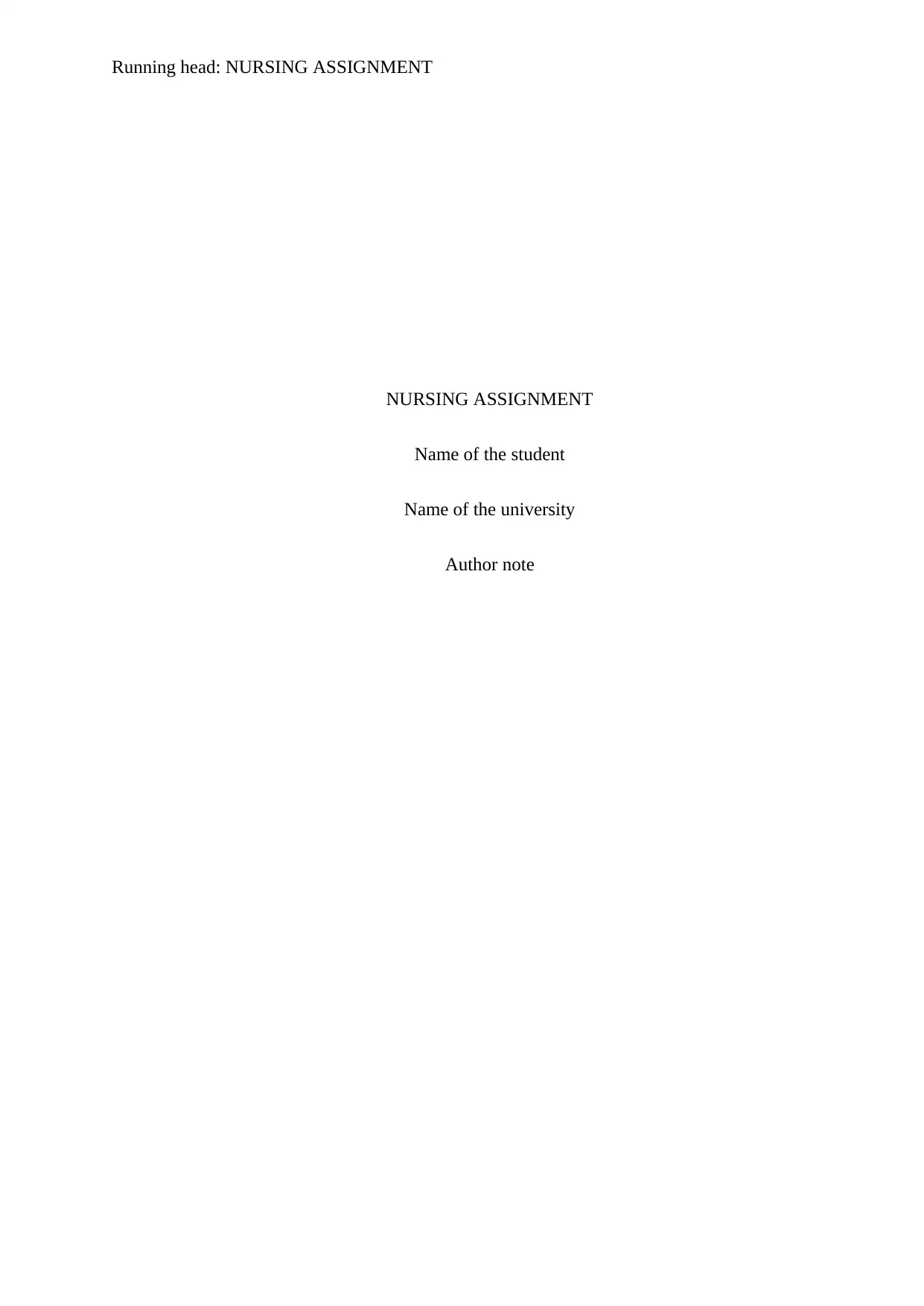
Running head: NURSING ASSIGNMENT
NURSING ASSIGNMENT
Name of the student
Name of the university
Author note
NURSING ASSIGNMENT
Name of the student
Name of the university
Author note
Paraphrase This Document
Need a fresh take? Get an instant paraphrase of this document with our AI Paraphraser
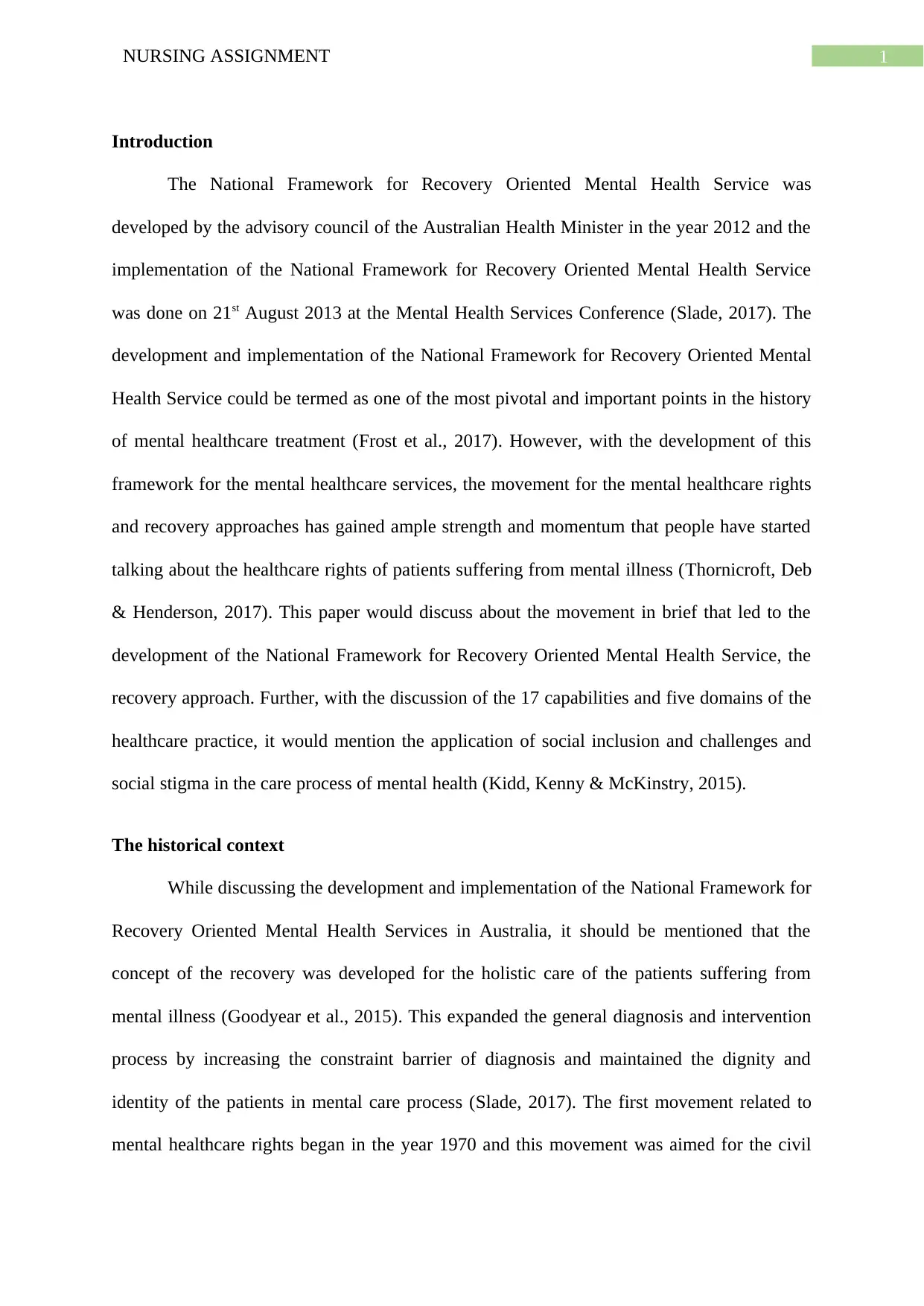
1NURSING ASSIGNMENT
Introduction
The National Framework for Recovery Oriented Mental Health Service was
developed by the advisory council of the Australian Health Minister in the year 2012 and the
implementation of the National Framework for Recovery Oriented Mental Health Service
was done on 21st August 2013 at the Mental Health Services Conference (Slade, 2017). The
development and implementation of the National Framework for Recovery Oriented Mental
Health Service could be termed as one of the most pivotal and important points in the history
of mental healthcare treatment (Frost et al., 2017). However, with the development of this
framework for the mental healthcare services, the movement for the mental healthcare rights
and recovery approaches has gained ample strength and momentum that people have started
talking about the healthcare rights of patients suffering from mental illness (Thornicroft, Deb
& Henderson, 2017). This paper would discuss about the movement in brief that led to the
development of the National Framework for Recovery Oriented Mental Health Service, the
recovery approach. Further, with the discussion of the 17 capabilities and five domains of the
healthcare practice, it would mention the application of social inclusion and challenges and
social stigma in the care process of mental health (Kidd, Kenny & McKinstry, 2015).
The historical context
While discussing the development and implementation of the National Framework for
Recovery Oriented Mental Health Services in Australia, it should be mentioned that the
concept of the recovery was developed for the holistic care of the patients suffering from
mental illness (Goodyear et al., 2015). This expanded the general diagnosis and intervention
process by increasing the constraint barrier of diagnosis and maintained the dignity and
identity of the patients in mental care process (Slade, 2017). The first movement related to
mental healthcare rights began in the year 1970 and this movement was aimed for the civil
Introduction
The National Framework for Recovery Oriented Mental Health Service was
developed by the advisory council of the Australian Health Minister in the year 2012 and the
implementation of the National Framework for Recovery Oriented Mental Health Service
was done on 21st August 2013 at the Mental Health Services Conference (Slade, 2017). The
development and implementation of the National Framework for Recovery Oriented Mental
Health Service could be termed as one of the most pivotal and important points in the history
of mental healthcare treatment (Frost et al., 2017). However, with the development of this
framework for the mental healthcare services, the movement for the mental healthcare rights
and recovery approaches has gained ample strength and momentum that people have started
talking about the healthcare rights of patients suffering from mental illness (Thornicroft, Deb
& Henderson, 2017). This paper would discuss about the movement in brief that led to the
development of the National Framework for Recovery Oriented Mental Health Service, the
recovery approach. Further, with the discussion of the 17 capabilities and five domains of the
healthcare practice, it would mention the application of social inclusion and challenges and
social stigma in the care process of mental health (Kidd, Kenny & McKinstry, 2015).
The historical context
While discussing the development and implementation of the National Framework for
Recovery Oriented Mental Health Services in Australia, it should be mentioned that the
concept of the recovery was developed for the holistic care of the patients suffering from
mental illness (Goodyear et al., 2015). This expanded the general diagnosis and intervention
process by increasing the constraint barrier of diagnosis and maintained the dignity and
identity of the patients in mental care process (Slade, 2017). The first movement related to
mental healthcare rights began in the year 1970 and this movement was aimed for the civil
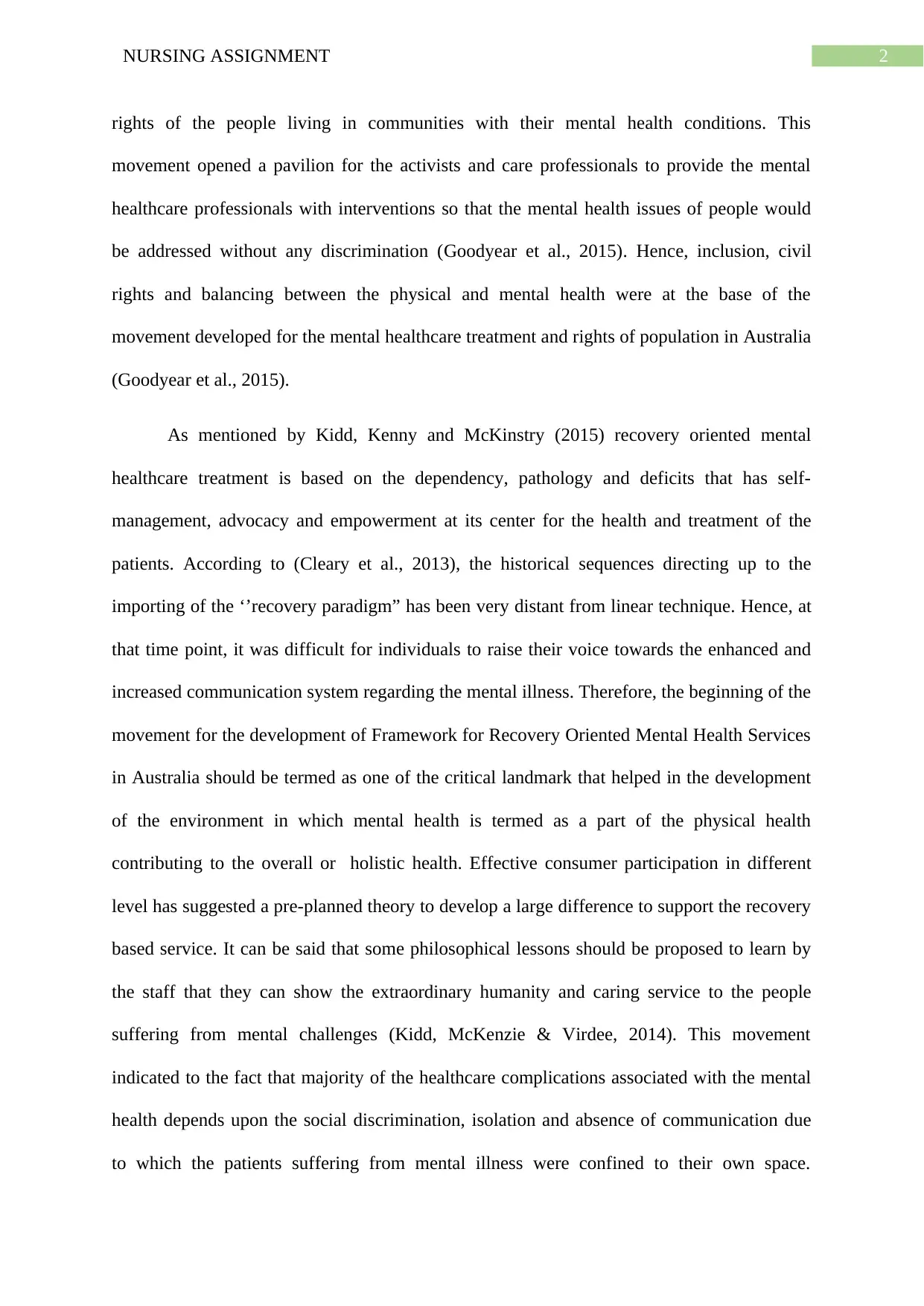
2NURSING ASSIGNMENT
rights of the people living in communities with their mental health conditions. This
movement opened a pavilion for the activists and care professionals to provide the mental
healthcare professionals with interventions so that the mental health issues of people would
be addressed without any discrimination (Goodyear et al., 2015). Hence, inclusion, civil
rights and balancing between the physical and mental health were at the base of the
movement developed for the mental healthcare treatment and rights of population in Australia
(Goodyear et al., 2015).
As mentioned by Kidd, Kenny and McKinstry (2015) recovery oriented mental
healthcare treatment is based on the dependency, pathology and deficits that has self-
management, advocacy and empowerment at its center for the health and treatment of the
patients. According to (Cleary et al., 2013), the historical sequences directing up to the
importing of the ‘’recovery paradigm” has been very distant from linear technique. Hence, at
that time point, it was difficult for individuals to raise their voice towards the enhanced and
increased communication system regarding the mental illness. Therefore, the beginning of the
movement for the development of Framework for Recovery Oriented Mental Health Services
in Australia should be termed as one of the critical landmark that helped in the development
of the environment in which mental health is termed as a part of the physical health
contributing to the overall or holistic health. Effective consumer participation in different
level has suggested a pre-planned theory to develop a large difference to support the recovery
based service. It can be said that some philosophical lessons should be proposed to learn by
the staff that they can show the extraordinary humanity and caring service to the people
suffering from mental challenges (Kidd, McKenzie & Virdee, 2014). This movement
indicated to the fact that majority of the healthcare complications associated with the mental
health depends upon the social discrimination, isolation and absence of communication due
to which the patients suffering from mental illness were confined to their own space.
rights of the people living in communities with their mental health conditions. This
movement opened a pavilion for the activists and care professionals to provide the mental
healthcare professionals with interventions so that the mental health issues of people would
be addressed without any discrimination (Goodyear et al., 2015). Hence, inclusion, civil
rights and balancing between the physical and mental health were at the base of the
movement developed for the mental healthcare treatment and rights of population in Australia
(Goodyear et al., 2015).
As mentioned by Kidd, Kenny and McKinstry (2015) recovery oriented mental
healthcare treatment is based on the dependency, pathology and deficits that has self-
management, advocacy and empowerment at its center for the health and treatment of the
patients. According to (Cleary et al., 2013), the historical sequences directing up to the
importing of the ‘’recovery paradigm” has been very distant from linear technique. Hence, at
that time point, it was difficult for individuals to raise their voice towards the enhanced and
increased communication system regarding the mental illness. Therefore, the beginning of the
movement for the development of Framework for Recovery Oriented Mental Health Services
in Australia should be termed as one of the critical landmark that helped in the development
of the environment in which mental health is termed as a part of the physical health
contributing to the overall or holistic health. Effective consumer participation in different
level has suggested a pre-planned theory to develop a large difference to support the recovery
based service. It can be said that some philosophical lessons should be proposed to learn by
the staff that they can show the extraordinary humanity and caring service to the people
suffering from mental challenges (Kidd, McKenzie & Virdee, 2014). This movement
indicated to the fact that majority of the healthcare complications associated with the mental
health depends upon the social discrimination, isolation and absence of communication due
to which the patients suffering from mental illness were confined to their own space.
⊘ This is a preview!⊘
Do you want full access?
Subscribe today to unlock all pages.

Trusted by 1+ million students worldwide
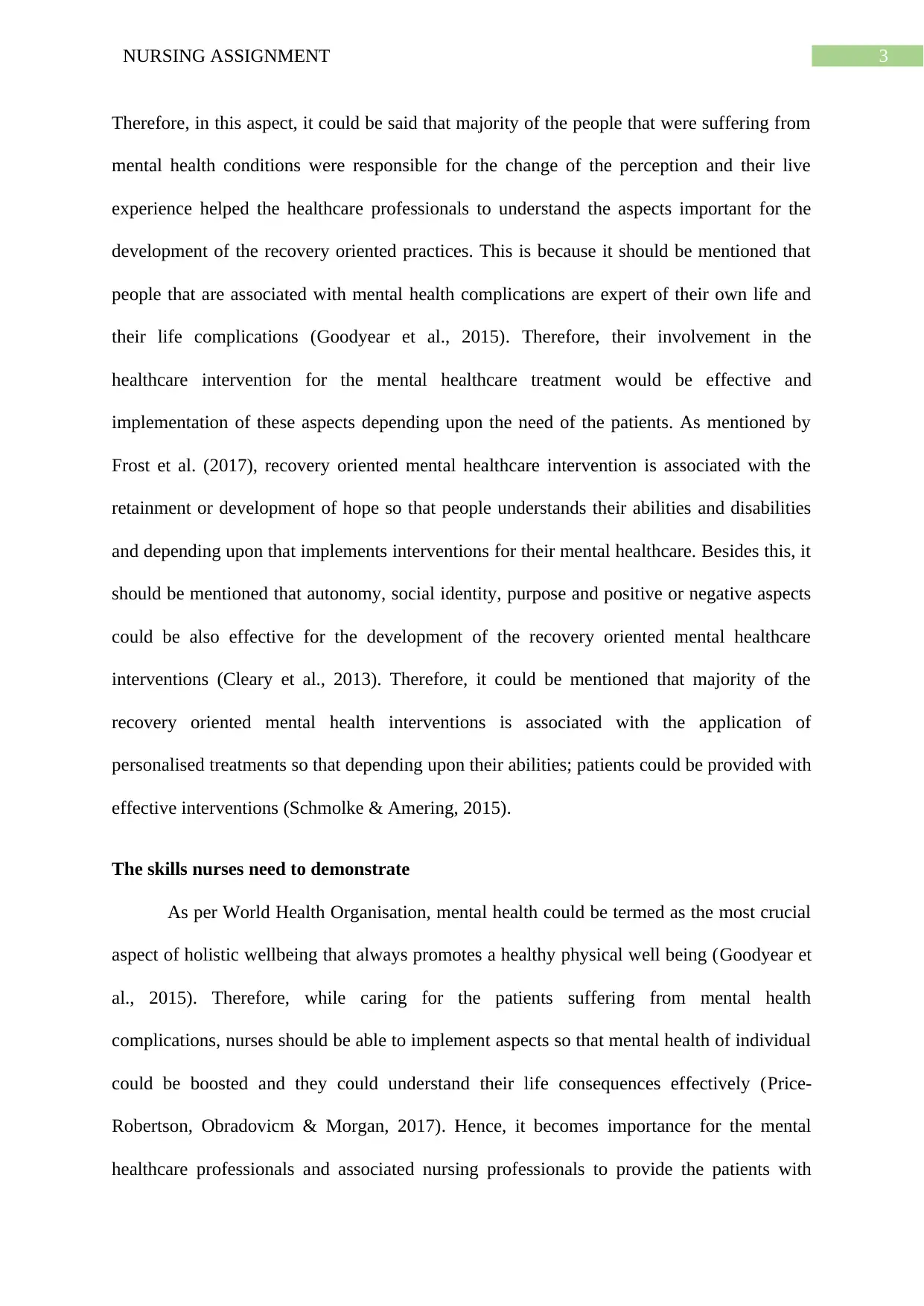
3NURSING ASSIGNMENT
Therefore, in this aspect, it could be said that majority of the people that were suffering from
mental health conditions were responsible for the change of the perception and their live
experience helped the healthcare professionals to understand the aspects important for the
development of the recovery oriented practices. This is because it should be mentioned that
people that are associated with mental health complications are expert of their own life and
their life complications (Goodyear et al., 2015). Therefore, their involvement in the
healthcare intervention for the mental healthcare treatment would be effective and
implementation of these aspects depending upon the need of the patients. As mentioned by
Frost et al. (2017), recovery oriented mental healthcare intervention is associated with the
retainment or development of hope so that people understands their abilities and disabilities
and depending upon that implements interventions for their mental healthcare. Besides this, it
should be mentioned that autonomy, social identity, purpose and positive or negative aspects
could be also effective for the development of the recovery oriented mental healthcare
interventions (Cleary et al., 2013). Therefore, it could be mentioned that majority of the
recovery oriented mental health interventions is associated with the application of
personalised treatments so that depending upon their abilities; patients could be provided with
effective interventions (Schmolke & Amering, 2015).
The skills nurses need to demonstrate
As per World Health Organisation, mental health could be termed as the most crucial
aspect of holistic wellbeing that always promotes a healthy physical well being (Goodyear et
al., 2015). Therefore, while caring for the patients suffering from mental health
complications, nurses should be able to implement aspects so that mental health of individual
could be boosted and they could understand their life consequences effectively (Price-
Robertson, Obradovicm & Morgan, 2017). Hence, it becomes importance for the mental
healthcare professionals and associated nursing professionals to provide the patients with
Therefore, in this aspect, it could be said that majority of the people that were suffering from
mental health conditions were responsible for the change of the perception and their live
experience helped the healthcare professionals to understand the aspects important for the
development of the recovery oriented practices. This is because it should be mentioned that
people that are associated with mental health complications are expert of their own life and
their life complications (Goodyear et al., 2015). Therefore, their involvement in the
healthcare intervention for the mental healthcare treatment would be effective and
implementation of these aspects depending upon the need of the patients. As mentioned by
Frost et al. (2017), recovery oriented mental healthcare intervention is associated with the
retainment or development of hope so that people understands their abilities and disabilities
and depending upon that implements interventions for their mental healthcare. Besides this, it
should be mentioned that autonomy, social identity, purpose and positive or negative aspects
could be also effective for the development of the recovery oriented mental healthcare
interventions (Cleary et al., 2013). Therefore, it could be mentioned that majority of the
recovery oriented mental health interventions is associated with the application of
personalised treatments so that depending upon their abilities; patients could be provided with
effective interventions (Schmolke & Amering, 2015).
The skills nurses need to demonstrate
As per World Health Organisation, mental health could be termed as the most crucial
aspect of holistic wellbeing that always promotes a healthy physical well being (Goodyear et
al., 2015). Therefore, while caring for the patients suffering from mental health
complications, nurses should be able to implement aspects so that mental health of individual
could be boosted and they could understand their life consequences effectively (Price-
Robertson, Obradovicm & Morgan, 2017). Hence, it becomes importance for the mental
healthcare professionals and associated nursing professionals to provide the patients with
Paraphrase This Document
Need a fresh take? Get an instant paraphrase of this document with our AI Paraphraser
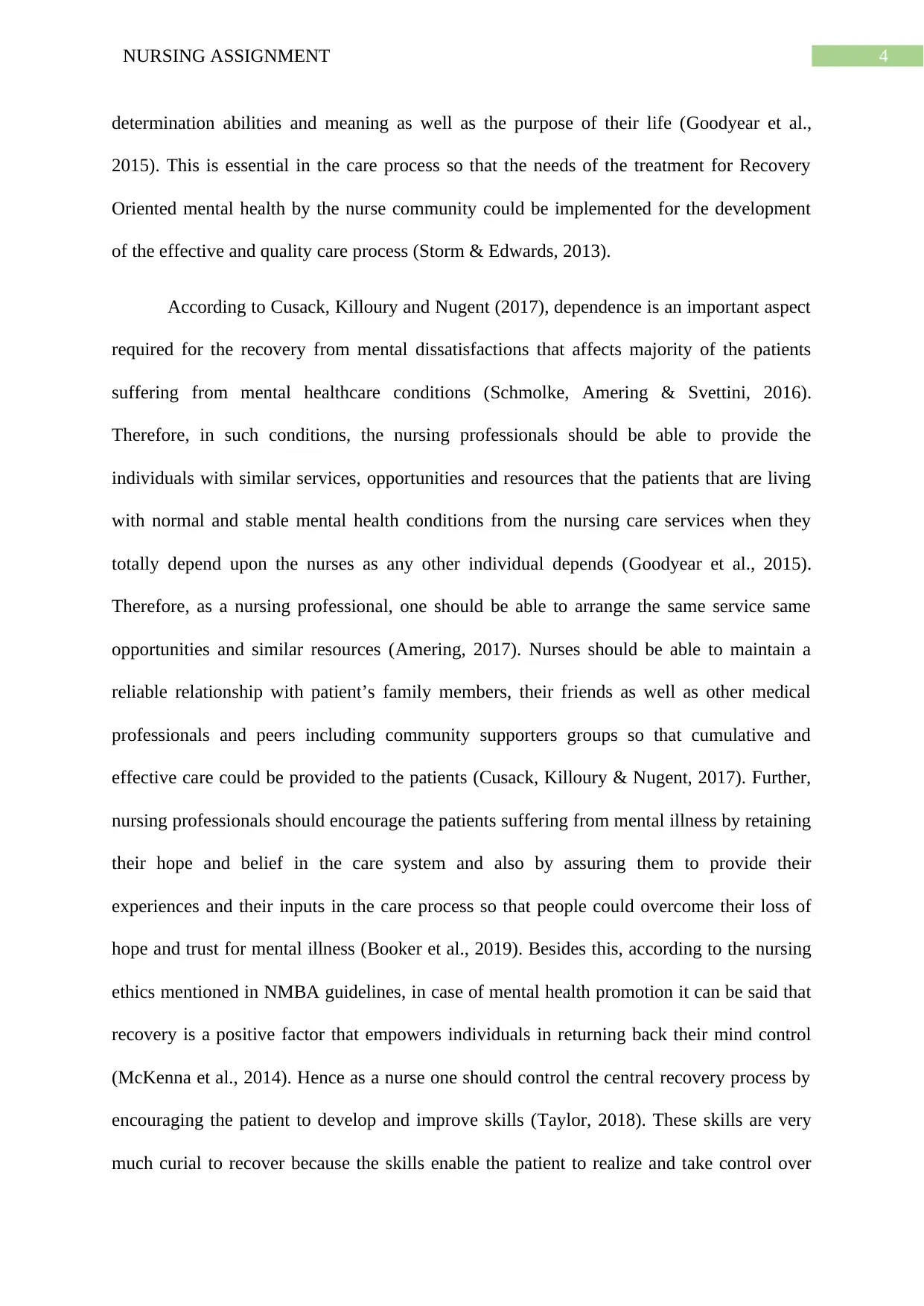
4NURSING ASSIGNMENT
determination abilities and meaning as well as the purpose of their life (Goodyear et al.,
2015). This is essential in the care process so that the needs of the treatment for Recovery
Oriented mental health by the nurse community could be implemented for the development
of the effective and quality care process (Storm & Edwards, 2013).
According to Cusack, Killoury and Nugent (2017), dependence is an important aspect
required for the recovery from mental dissatisfactions that affects majority of the patients
suffering from mental healthcare conditions (Schmolke, Amering & Svettini, 2016).
Therefore, in such conditions, the nursing professionals should be able to provide the
individuals with similar services, opportunities and resources that the patients that are living
with normal and stable mental health conditions from the nursing care services when they
totally depend upon the nurses as any other individual depends (Goodyear et al., 2015).
Therefore, as a nursing professional, one should be able to arrange the same service same
opportunities and similar resources (Amering, 2017). Nurses should be able to maintain a
reliable relationship with patient’s family members, their friends as well as other medical
professionals and peers including community supporters groups so that cumulative and
effective care could be provided to the patients (Cusack, Killoury & Nugent, 2017). Further,
nursing professionals should encourage the patients suffering from mental illness by retaining
their hope and belief in the care system and also by assuring them to provide their
experiences and their inputs in the care process so that people could overcome their loss of
hope and trust for mental illness (Booker et al., 2019). Besides this, according to the nursing
ethics mentioned in NMBA guidelines, in case of mental health promotion it can be said that
recovery is a positive factor that empowers individuals in returning back their mind control
(McKenna et al., 2014). Hence as a nurse one should control the central recovery process by
encouraging the patient to develop and improve skills (Taylor, 2018). These skills are very
much curial to recover because the skills enable the patient to realize and take control over
determination abilities and meaning as well as the purpose of their life (Goodyear et al.,
2015). This is essential in the care process so that the needs of the treatment for Recovery
Oriented mental health by the nurse community could be implemented for the development
of the effective and quality care process (Storm & Edwards, 2013).
According to Cusack, Killoury and Nugent (2017), dependence is an important aspect
required for the recovery from mental dissatisfactions that affects majority of the patients
suffering from mental healthcare conditions (Schmolke, Amering & Svettini, 2016).
Therefore, in such conditions, the nursing professionals should be able to provide the
individuals with similar services, opportunities and resources that the patients that are living
with normal and stable mental health conditions from the nursing care services when they
totally depend upon the nurses as any other individual depends (Goodyear et al., 2015).
Therefore, as a nursing professional, one should be able to arrange the same service same
opportunities and similar resources (Amering, 2017). Nurses should be able to maintain a
reliable relationship with patient’s family members, their friends as well as other medical
professionals and peers including community supporters groups so that cumulative and
effective care could be provided to the patients (Cusack, Killoury & Nugent, 2017). Further,
nursing professionals should encourage the patients suffering from mental illness by retaining
their hope and belief in the care system and also by assuring them to provide their
experiences and their inputs in the care process so that people could overcome their loss of
hope and trust for mental illness (Booker et al., 2019). Besides this, according to the nursing
ethics mentioned in NMBA guidelines, in case of mental health promotion it can be said that
recovery is a positive factor that empowers individuals in returning back their mind control
(McKenna et al., 2014). Hence as a nurse one should control the central recovery process by
encouraging the patient to develop and improve skills (Taylor, 2018). These skills are very
much curial to recover because the skills enable the patient to realize and take control over
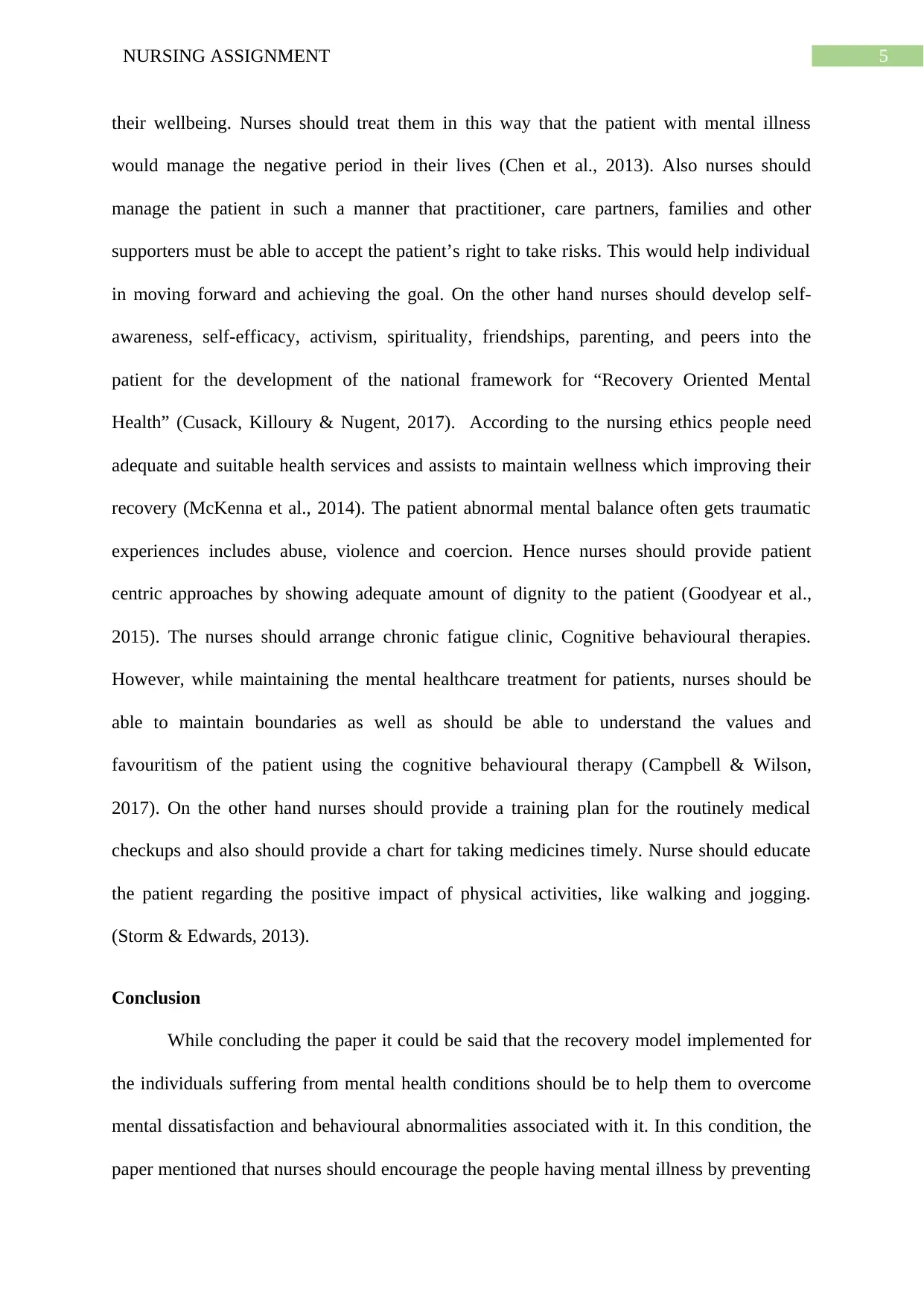
5NURSING ASSIGNMENT
their wellbeing. Nurses should treat them in this way that the patient with mental illness
would manage the negative period in their lives (Chen et al., 2013). Also nurses should
manage the patient in such a manner that practitioner, care partners, families and other
supporters must be able to accept the patient’s right to take risks. This would help individual
in moving forward and achieving the goal. On the other hand nurses should develop self-
awareness, self-efficacy, activism, spirituality, friendships, parenting, and peers into the
patient for the development of the national framework for “Recovery Oriented Mental
Health” (Cusack, Killoury & Nugent, 2017). According to the nursing ethics people need
adequate and suitable health services and assists to maintain wellness which improving their
recovery (McKenna et al., 2014). The patient abnormal mental balance often gets traumatic
experiences includes abuse, violence and coercion. Hence nurses should provide patient
centric approaches by showing adequate amount of dignity to the patient (Goodyear et al.,
2015). The nurses should arrange chronic fatigue clinic, Cognitive behavioural therapies.
However, while maintaining the mental healthcare treatment for patients, nurses should be
able to maintain boundaries as well as should be able to understand the values and
favouritism of the patient using the cognitive behavioural therapy (Campbell & Wilson,
2017). On the other hand nurses should provide a training plan for the routinely medical
checkups and also should provide a chart for taking medicines timely. Nurse should educate
the patient regarding the positive impact of physical activities, like walking and jogging.
(Storm & Edwards, 2013).
Conclusion
While concluding the paper it could be said that the recovery model implemented for
the individuals suffering from mental health conditions should be to help them to overcome
mental dissatisfaction and behavioural abnormalities associated with it. In this condition, the
paper mentioned that nurses should encourage the people having mental illness by preventing
their wellbeing. Nurses should treat them in this way that the patient with mental illness
would manage the negative period in their lives (Chen et al., 2013). Also nurses should
manage the patient in such a manner that practitioner, care partners, families and other
supporters must be able to accept the patient’s right to take risks. This would help individual
in moving forward and achieving the goal. On the other hand nurses should develop self-
awareness, self-efficacy, activism, spirituality, friendships, parenting, and peers into the
patient for the development of the national framework for “Recovery Oriented Mental
Health” (Cusack, Killoury & Nugent, 2017). According to the nursing ethics people need
adequate and suitable health services and assists to maintain wellness which improving their
recovery (McKenna et al., 2014). The patient abnormal mental balance often gets traumatic
experiences includes abuse, violence and coercion. Hence nurses should provide patient
centric approaches by showing adequate amount of dignity to the patient (Goodyear et al.,
2015). The nurses should arrange chronic fatigue clinic, Cognitive behavioural therapies.
However, while maintaining the mental healthcare treatment for patients, nurses should be
able to maintain boundaries as well as should be able to understand the values and
favouritism of the patient using the cognitive behavioural therapy (Campbell & Wilson,
2017). On the other hand nurses should provide a training plan for the routinely medical
checkups and also should provide a chart for taking medicines timely. Nurse should educate
the patient regarding the positive impact of physical activities, like walking and jogging.
(Storm & Edwards, 2013).
Conclusion
While concluding the paper it could be said that the recovery model implemented for
the individuals suffering from mental health conditions should be to help them to overcome
mental dissatisfaction and behavioural abnormalities associated with it. In this condition, the
paper mentioned that nurses should encourage the people having mental illness by preventing
⊘ This is a preview!⊘
Do you want full access?
Subscribe today to unlock all pages.

Trusted by 1+ million students worldwide
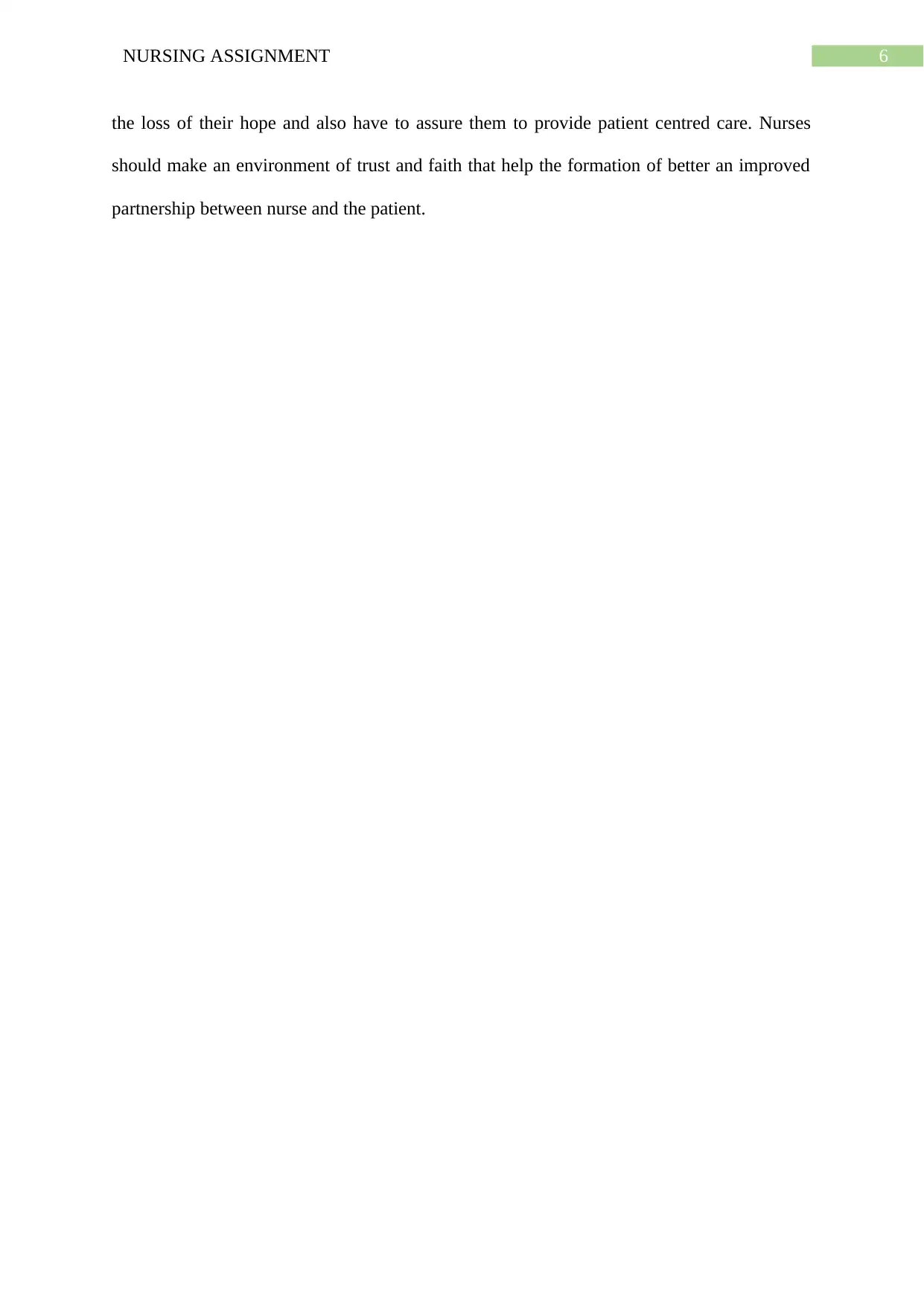
6NURSING ASSIGNMENT
the loss of their hope and also have to assure them to provide patient centred care. Nurses
should make an environment of trust and faith that help the formation of better an improved
partnership between nurse and the patient.
the loss of their hope and also have to assure them to provide patient centred care. Nurses
should make an environment of trust and faith that help the formation of better an improved
partnership between nurse and the patient.
Paraphrase This Document
Need a fresh take? Get an instant paraphrase of this document with our AI Paraphraser
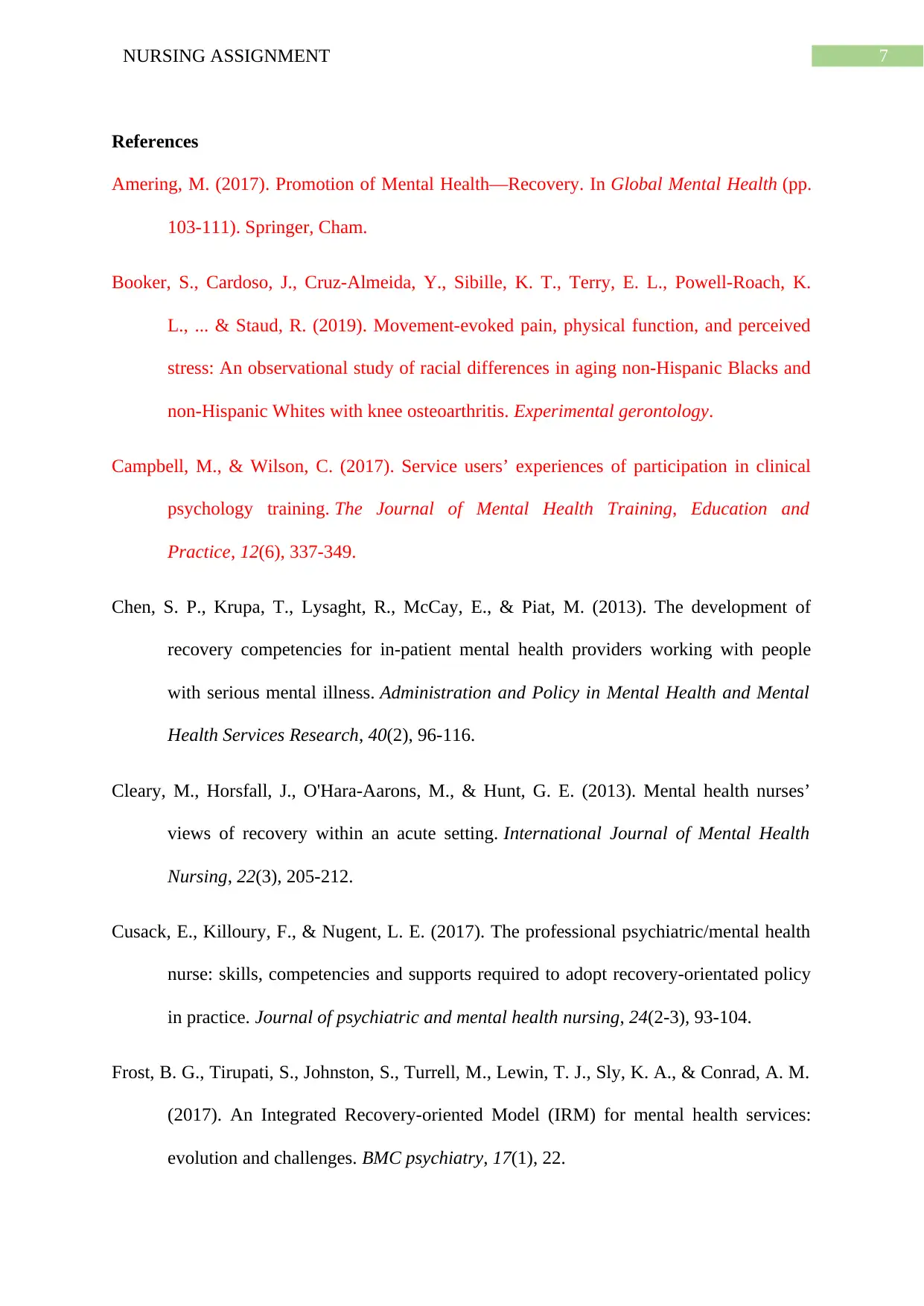
7NURSING ASSIGNMENT
References
Amering, M. (2017). Promotion of Mental Health—Recovery. In Global Mental Health (pp.
103-111). Springer, Cham.
Booker, S., Cardoso, J., Cruz-Almeida, Y., Sibille, K. T., Terry, E. L., Powell-Roach, K.
L., ... & Staud, R. (2019). Movement-evoked pain, physical function, and perceived
stress: An observational study of racial differences in aging non-Hispanic Blacks and
non-Hispanic Whites with knee osteoarthritis. Experimental gerontology.
Campbell, M., & Wilson, C. (2017). Service users’ experiences of participation in clinical
psychology training. The Journal of Mental Health Training, Education and
Practice, 12(6), 337-349.
Chen, S. P., Krupa, T., Lysaght, R., McCay, E., & Piat, M. (2013). The development of
recovery competencies for in-patient mental health providers working with people
with serious mental illness. Administration and Policy in Mental Health and Mental
Health Services Research, 40(2), 96-116.
Cleary, M., Horsfall, J., O'Hara‐Aarons, M., & Hunt, G. E. (2013). Mental health nurses’
views of recovery within an acute setting. International Journal of Mental Health
Nursing, 22(3), 205-212.
Cusack, E., Killoury, F., & Nugent, L. E. (2017). The professional psychiatric/mental health
nurse: skills, competencies and supports required to adopt recovery‐orientated policy
in practice. Journal of psychiatric and mental health nursing, 24(2-3), 93-104.
Frost, B. G., Tirupati, S., Johnston, S., Turrell, M., Lewin, T. J., Sly, K. A., & Conrad, A. M.
(2017). An Integrated Recovery-oriented Model (IRM) for mental health services:
evolution and challenges. BMC psychiatry, 17(1), 22.
References
Amering, M. (2017). Promotion of Mental Health—Recovery. In Global Mental Health (pp.
103-111). Springer, Cham.
Booker, S., Cardoso, J., Cruz-Almeida, Y., Sibille, K. T., Terry, E. L., Powell-Roach, K.
L., ... & Staud, R. (2019). Movement-evoked pain, physical function, and perceived
stress: An observational study of racial differences in aging non-Hispanic Blacks and
non-Hispanic Whites with knee osteoarthritis. Experimental gerontology.
Campbell, M., & Wilson, C. (2017). Service users’ experiences of participation in clinical
psychology training. The Journal of Mental Health Training, Education and
Practice, 12(6), 337-349.
Chen, S. P., Krupa, T., Lysaght, R., McCay, E., & Piat, M. (2013). The development of
recovery competencies for in-patient mental health providers working with people
with serious mental illness. Administration and Policy in Mental Health and Mental
Health Services Research, 40(2), 96-116.
Cleary, M., Horsfall, J., O'Hara‐Aarons, M., & Hunt, G. E. (2013). Mental health nurses’
views of recovery within an acute setting. International Journal of Mental Health
Nursing, 22(3), 205-212.
Cusack, E., Killoury, F., & Nugent, L. E. (2017). The professional psychiatric/mental health
nurse: skills, competencies and supports required to adopt recovery‐orientated policy
in practice. Journal of psychiatric and mental health nursing, 24(2-3), 93-104.
Frost, B. G., Tirupati, S., Johnston, S., Turrell, M., Lewin, T. J., Sly, K. A., & Conrad, A. M.
(2017). An Integrated Recovery-oriented Model (IRM) for mental health services:
evolution and challenges. BMC psychiatry, 17(1), 22.
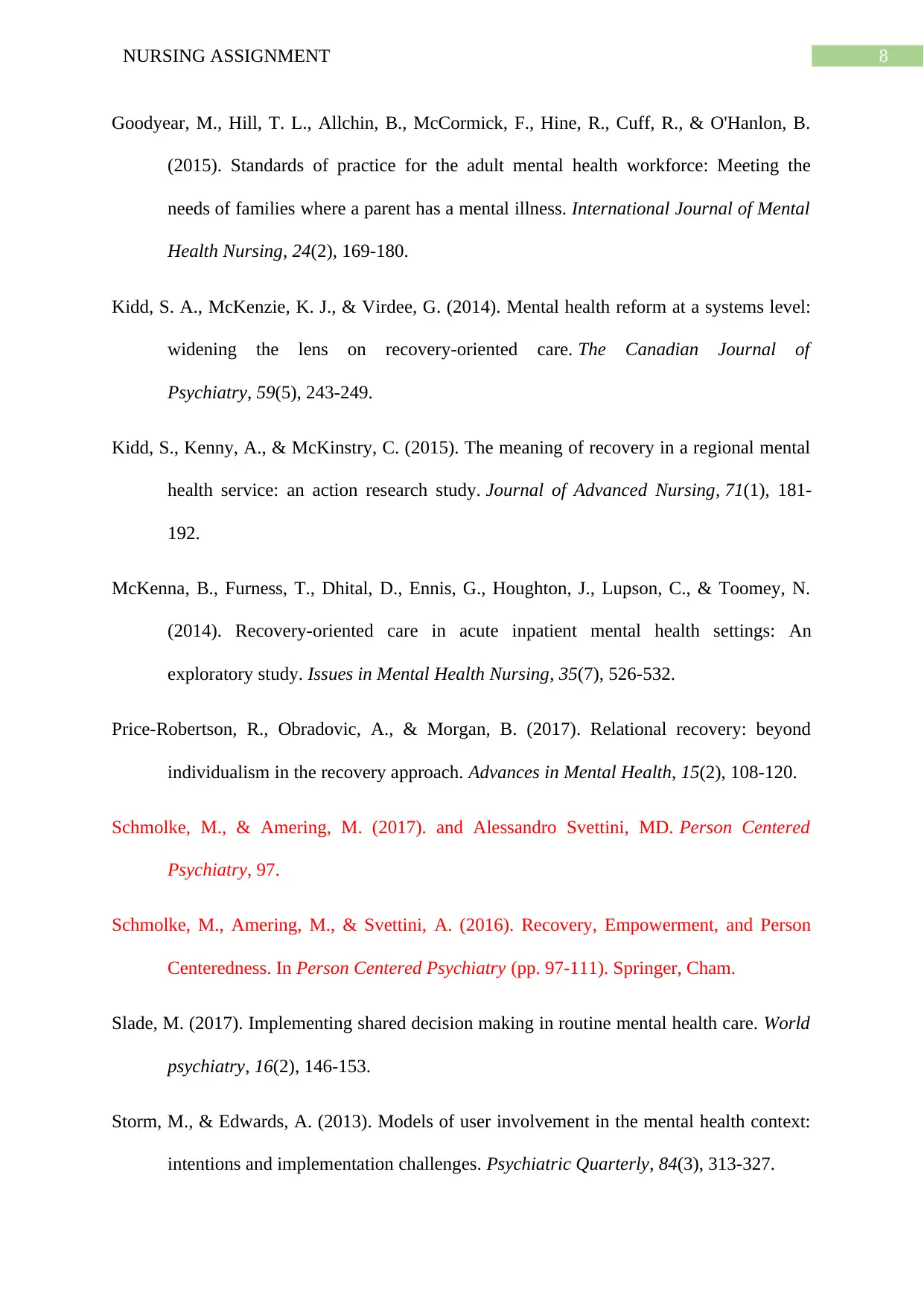
8NURSING ASSIGNMENT
Goodyear, M., Hill, T. L., Allchin, B., McCormick, F., Hine, R., Cuff, R., & O'Hanlon, B.
(2015). Standards of practice for the adult mental health workforce: Meeting the
needs of families where a parent has a mental illness. International Journal of Mental
Health Nursing, 24(2), 169-180.
Kidd, S. A., McKenzie, K. J., & Virdee, G. (2014). Mental health reform at a systems level:
widening the lens on recovery-oriented care. The Canadian Journal of
Psychiatry, 59(5), 243-249.
Kidd, S., Kenny, A., & McKinstry, C. (2015). The meaning of recovery in a regional mental
health service: an action research study. Journal of Advanced Nursing, 71(1), 181-
192.
McKenna, B., Furness, T., Dhital, D., Ennis, G., Houghton, J., Lupson, C., & Toomey, N.
(2014). Recovery-oriented care in acute inpatient mental health settings: An
exploratory study. Issues in Mental Health Nursing, 35(7), 526-532.
Price-Robertson, R., Obradovic, A., & Morgan, B. (2017). Relational recovery: beyond
individualism in the recovery approach. Advances in Mental Health, 15(2), 108-120.
Schmolke, M., & Amering, M. (2017). and Alessandro Svettini, MD. Person Centered
Psychiatry, 97.
Schmolke, M., Amering, M., & Svettini, A. (2016). Recovery, Empowerment, and Person
Centeredness. In Person Centered Psychiatry (pp. 97-111). Springer, Cham.
Slade, M. (2017). Implementing shared decision making in routine mental health care. World
psychiatry, 16(2), 146-153.
Storm, M., & Edwards, A. (2013). Models of user involvement in the mental health context:
intentions and implementation challenges. Psychiatric Quarterly, 84(3), 313-327.
Goodyear, M., Hill, T. L., Allchin, B., McCormick, F., Hine, R., Cuff, R., & O'Hanlon, B.
(2015). Standards of practice for the adult mental health workforce: Meeting the
needs of families where a parent has a mental illness. International Journal of Mental
Health Nursing, 24(2), 169-180.
Kidd, S. A., McKenzie, K. J., & Virdee, G. (2014). Mental health reform at a systems level:
widening the lens on recovery-oriented care. The Canadian Journal of
Psychiatry, 59(5), 243-249.
Kidd, S., Kenny, A., & McKinstry, C. (2015). The meaning of recovery in a regional mental
health service: an action research study. Journal of Advanced Nursing, 71(1), 181-
192.
McKenna, B., Furness, T., Dhital, D., Ennis, G., Houghton, J., Lupson, C., & Toomey, N.
(2014). Recovery-oriented care in acute inpatient mental health settings: An
exploratory study. Issues in Mental Health Nursing, 35(7), 526-532.
Price-Robertson, R., Obradovic, A., & Morgan, B. (2017). Relational recovery: beyond
individualism in the recovery approach. Advances in Mental Health, 15(2), 108-120.
Schmolke, M., & Amering, M. (2017). and Alessandro Svettini, MD. Person Centered
Psychiatry, 97.
Schmolke, M., Amering, M., & Svettini, A. (2016). Recovery, Empowerment, and Person
Centeredness. In Person Centered Psychiatry (pp. 97-111). Springer, Cham.
Slade, M. (2017). Implementing shared decision making in routine mental health care. World
psychiatry, 16(2), 146-153.
Storm, M., & Edwards, A. (2013). Models of user involvement in the mental health context:
intentions and implementation challenges. Psychiatric Quarterly, 84(3), 313-327.
⊘ This is a preview!⊘
Do you want full access?
Subscribe today to unlock all pages.

Trusted by 1+ million students worldwide
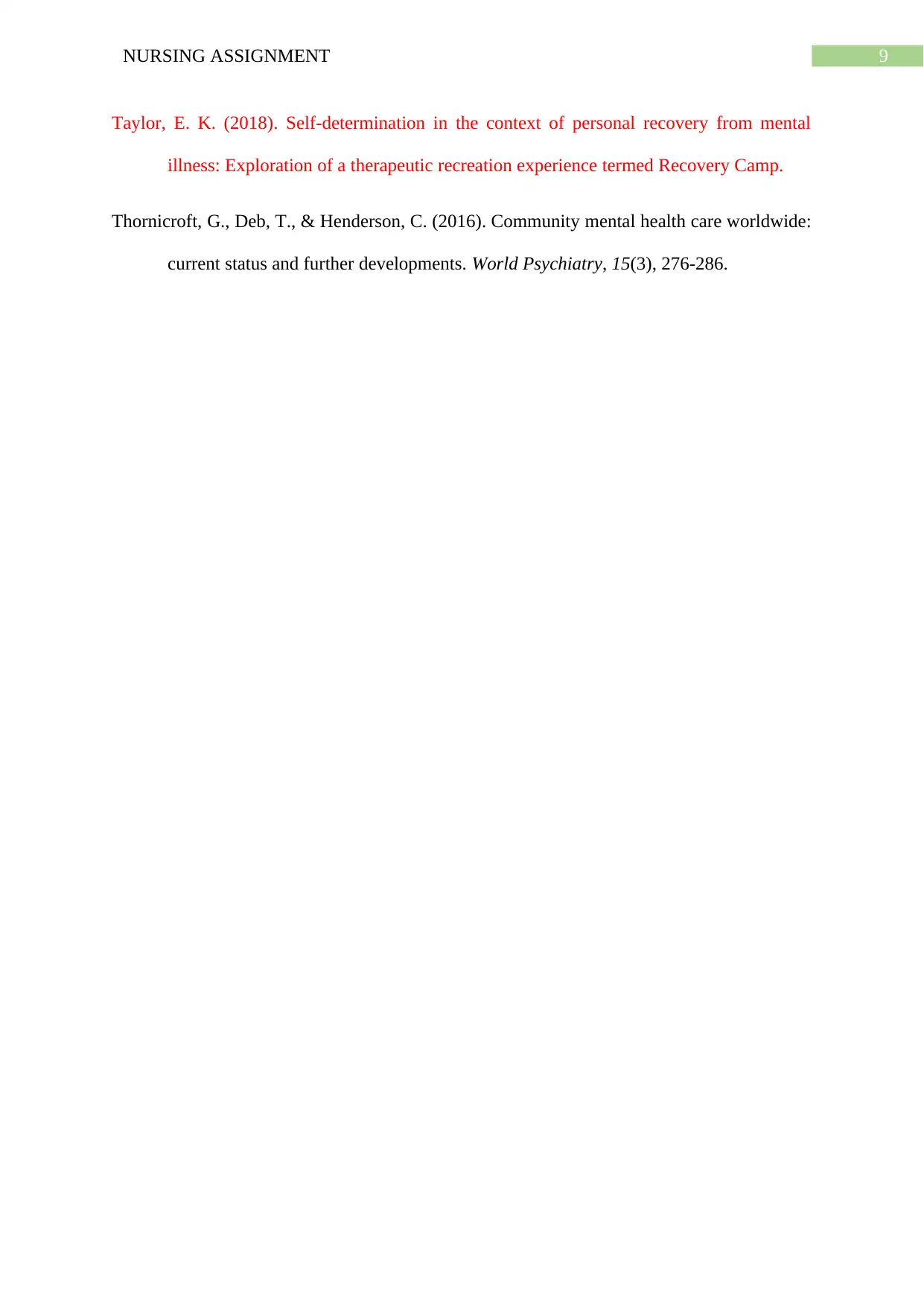
9NURSING ASSIGNMENT
Taylor, E. K. (2018). Self-determination in the context of personal recovery from mental
illness: Exploration of a therapeutic recreation experience termed Recovery Camp.
Thornicroft, G., Deb, T., & Henderson, C. (2016). Community mental health care worldwide:
current status and further developments. World Psychiatry, 15(3), 276-286.
Taylor, E. K. (2018). Self-determination in the context of personal recovery from mental
illness: Exploration of a therapeutic recreation experience termed Recovery Camp.
Thornicroft, G., Deb, T., & Henderson, C. (2016). Community mental health care worldwide:
current status and further developments. World Psychiatry, 15(3), 276-286.
1 out of 10
Related Documents
Your All-in-One AI-Powered Toolkit for Academic Success.
+13062052269
info@desklib.com
Available 24*7 on WhatsApp / Email
![[object Object]](/_next/static/media/star-bottom.7253800d.svg)
Unlock your academic potential
Copyright © 2020–2026 A2Z Services. All Rights Reserved. Developed and managed by ZUCOL.





